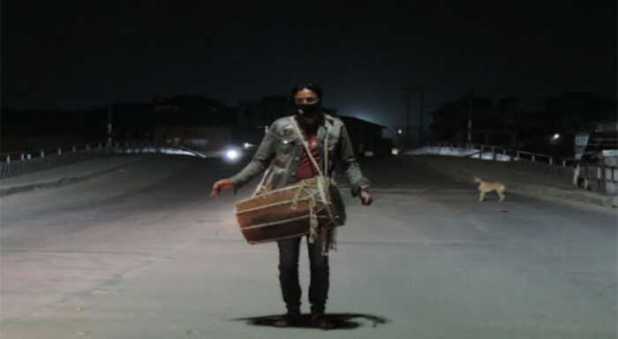
Srinagar, April 4 : Residents in downtown Srinagar are awakened during the Ramzan month from their slumber for “Sehri” by the drum rolls matched to the recitation of the Quranic verses that reverberates through the capital of Jammu and Kashmir. It is 23-year-old Mohammad Shaqoor who beats the drum and chants “Waqt-e-Sahar” (time for the pre dawn meals) to wake people to have “Sehri” (pre-dawn meal) for keeping fast for the day. Popularly known as “Sahar Khan” Shaqoor, a resident of Kalaroose in frontier Kashmir district of Kupwara, is accompanied by his fellow villager Rai Imtiyaz who holds a long big Bamboo stick to ward off stray dogs. They have been doing so for the past nine years, starting their journey to awaken people at 3 am from Safakadal, Haftyarbal, Zadi Masjid, Chai Dubb, Poshwala and covering many other areas walking around three km daily on foot during the holy Islam month. The tradition of “Sahar Khan” awaking people during the night for “sehri” is as old as the advent of Islam in the Valley, people believe. “We are doing this job happily during the month of Ramzan just to earn rewards from the Almighty Allah”, Shaqoor said. He although acknowledged “no doubt during the end of the month people pay us whatever they like which helps us a lot to manage our family affairs”. He said that it helps everyone to offer all prayers on time, including the special prayer “Tarawe” during this month also. He said, ‘earlier we were leaving around 1 am in the night to awake the people as a lot of area had to be covered for the call but this year the time table has changed as there is change in time for the “sehri”. He said “during the past several years we had to get permission from the police for this job as the situation was not as good as it is at present. Now the Mosque president allows us for “Sehri” awakening call”. Shaqoor said he works as a labourer otherwise through the greater part of the year. While some of the “Sahar Khans” do this job primarily for monetary gains, there are many others who take up this work for earning heavenly rewards. Many youth have started underestimating the significance and tradition of “Sahar Khan”as they say the technology has made the “Sahar Khan” tradition obsolete with the availability of modern gadgetry like cell phones, alarm clocks and radios available in the houses. “I don’t think there is any need of “Sahar Khan” these days when I have an alarm in my cell phone,” says Ashraf, a youngster from Srinagar. However, the view is not shared by other people, especially the elder comm ty who feel this tradition, nevertheless, should continue. “It’s a part of our culture. I still wait for Sahar Khan’s drum beats to wake me up,” says 51-year-old, Khursheed Ahmad a resident of Hawal here. “It takes me back to my childhood days when I would cheer up on hearing those drum beats.” QAB ING

